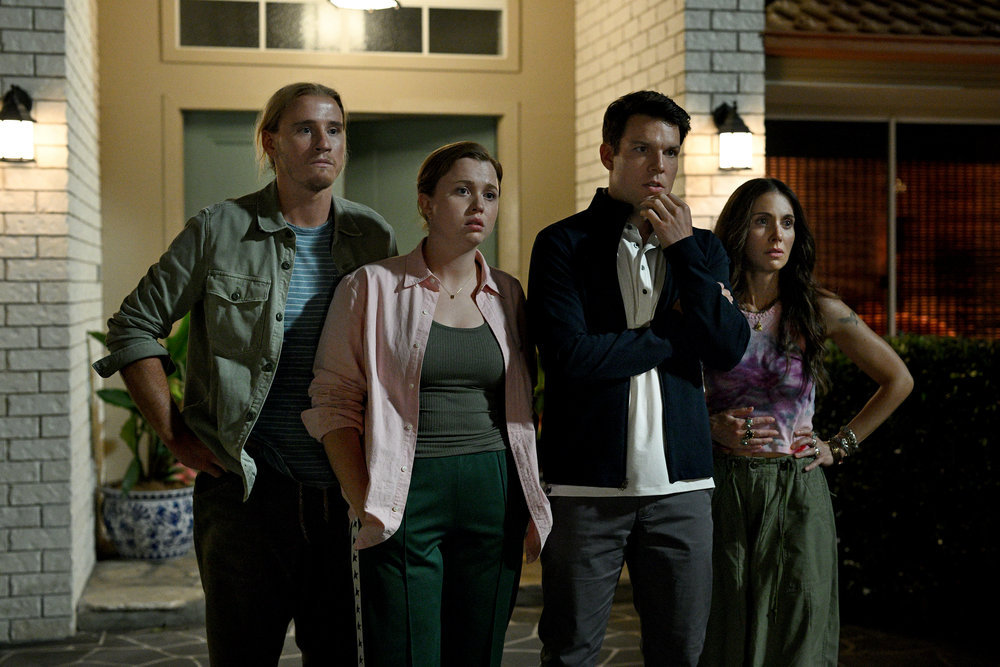Peacock’s ‘Apples Never Fall’ follows the unraveling of an already dysfunctional family when its matriarch goes missing without a trace. Joy Delaney was a dedicated mother and the thread holding her entire family together. When she stops taking calls, and neither her friends nor her children get to speak with her for a couple of days, they start to wonder what has happened to her. What makes things even worse is that Joy’s husband, Stan, lies about her whereabouts.
As the search for Joy begins, the secrets and lies of the Delaney family come to light. Unexpected twists and turns abound, but keeping the audience in line with the core theme of the show, the three-word title gives us enough to know what the story is all about. The title lends great meaning to a lot of things that are in the subtext of the story. SPOILERS AHEAD
Apples Never Fall Refers to the Dynamics of the Delaneys

‘Apples Never Fall’ refers to the proverb “the apple never falls far from the tree.” The first connection with the title appears in the first scene of the show, where we find Joy shopping for apples. Later, we see her fallen bike with blood over it and the apples she’d bought spread out on the road. But, of course, the connection goes much deeper than this.
The proverb about the apple and the tree refers to the similarity between a parent and their child. Whatever the differences may be between them, according to the proverb, children are usually, in some very peculiar and yet curiously obvious contexts, the same as their parents. No matter how much a person tries to show that they are not like their parents, it turns out that they actually are. This rings particularly strongly in the Peacock series, based on Liane Moriarty’s novel of the same name.
When the story begins, we see the picture-perfect Delaney family: Joy and Stan in love and their four doting children, each with their own path in life. Slowly, however, all their flaws and follies come to light, and it becomes clear that none of them is infallible. When Joy is removed from the equation following her sudden disappearance, it becomes much clearer that the children are, in a lot of ways, the same as their parents, especially their father.
At one point, the eldest child, Troy, confesses that his family has the habit of protecting their father, Stan. Even when they hate their father for certain things, they end up becoming the same thing, though they claim to be nothing like Stan. Troy, for example, decides not to let his father’s judgment or fear of his disappointment dictate his life. But then, he subconsciously ends up doing the same, which Lucia eventually points out as the form of his Oedipal complex.

Even if one weren’t to go as deep as exploring the subconscious behavior of the Delaney siblings, it’s clear on the surface how much they have been influenced by their father’s behavior and how much of it they emulate in their own lives, especially when it comes to their mother. Stan always prioritized his career and dreams; he had the habit of walking away whenever things got tough at home, he would always find someone to blame for his failures, and he’d always want things to happen his way. He had been dependent on Joy to keep things running his entire life, but he never acknowledged or noticed it.
His children turn out to be the same. They all take their mother for granted, carrying the habit of prioritizing what they want and never stopping to consider what the other person might be going through. Though they show they hate certain things about their father, they also cocoon themselves within the same aspects of his personality and refuse to get out of it. They find excuses for their behaviors, blaming someone or something for what they did or didn’t do. Just like their father, they remain blind to their own flaws, wondering why things always turn bad for them.
Joy’s absence forces them to confront that reality and see that they are all so similar at their core when their appearances might deceive them into thinking they are worlds apart. This realization particularly hits home when the buffer of their mother is removed, and they have their father standing in front of them as a mirror. It’s the parent they hated all this while, and it turns out they are more similar to him than they’d care to accept. The story hints at this through its events and how the children and their parents react to these things, making the title even more meaningful.
Read More: Peacock’s Apples Never Fall: Fictional or True Story?


You must be logged in to post a comment.